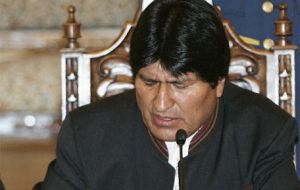MercoPress. South Atlantic News Agency
Uruguay/Bolivia sign agreement to exchange natural gas for sea outlet
 Evo Morales praised Uruguay’s support
Evo Morales praised Uruguay’s support Bolivia will gain access to Atlantic ports in Uruguay in exchange for a pledge of natural gas exports to Montevideo in an agreement signed in La Paz by presidents Evo Morales and José Mujica.
A new road will follow the Paraguay-Paraná river system, while the Andean Development Corporation (CAF) will begin construction of a new pipeline between the countries. The regional grouping URPABOL (Uruguay-Paraguay-Bolivia) has approved the project, and Brazil is also expected to cooperate, with its Puerto Cáceres serving as one hub on the river route.
CAF has long been studying ambitious plans for a “Hidrovía” (water way) to convert the Paraguay and Paraná rivers into an industrial shipping channel. Under the original plan developed in 1997 by the Hidrovía Inter–Governmental Commission (CIH), with support from the Inter-American Development Bank and the UN Development Program, massive dredging and structural channelling would have taken place at hundreds of sites along the 2,100-mile river system.
However grave concerns were expressed by ecologists for the fate of southern Brazil's Pantanal, the world's largest tropical wetlands, which was expected to shrink as a result of the water diversions, with associated losses in biodiversity.
The original studies for this project were rejected as a result of independent technical critiques, organized by Brazil's Rios Vivos coalition. The CAF has provided CIH with 940,000 USD for new studies, to “complement” the original studies. The project still calls for intensive dredging to guarantee passage of barge convoys through 23 “critical” river passes, including those in Bolivia's Tamengo Channel and between Corumbá and the Rio Apa in the Pantanal. (International Rivers)




Top Comments
Disclaimer & comment rulesCommenting for this story is now closed.
If you have a Facebook account, become a fan and comment on our Facebook Page!